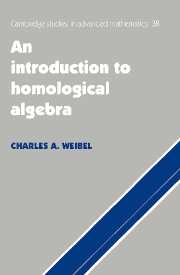Book contents
- Frontmatter
- Acknowledgments
- Contents
- Introduction
- 1 Chain Complexes
- 2 Derived Functors
- 3 Tor and Ext
- 4 Homological Dimension
- 5 Spectral Sequences
- 6 Group Homology and Cohomology
- 7 Lie Algebra Homology and Cohomology
- 8 Simplicial Methods in Homological Algebra
- 9 Hochschild and Cyclic Homology
- 10 The Derived Category
- A Category Theory Language
- References
- Index
10 - The Derived Category
Published online by Cambridge University Press: 05 March 2013
- Frontmatter
- Acknowledgments
- Contents
- Introduction
- 1 Chain Complexes
- 2 Derived Functors
- 3 Tor and Ext
- 4 Homological Dimension
- 5 Spectral Sequences
- 6 Group Homology and Cohomology
- 7 Lie Algebra Homology and Cohomology
- 8 Simplicial Methods in Homological Algebra
- 9 Hochschild and Cyclic Homology
- 10 The Derived Category
- A Category Theory Language
- References
- Index
Summary
There are many formal similarities between homological algebra and algebraic topology. The Dold-Kan correspondence, for example, provides a dictionary between positive complexes and simplicial theory. The algebraic notions of chain homotopy, mapping cones, and mapping cylinders have their historical origins in simplicial topology.
The derived category D(A) of an abelian category is the algebraic analogue of the homotopy category of topological spaces. D(A) is obtained from the category Ch(A) of (cochain) complexes in two stages. First one constructs a quotient K(A) of Ch(A) by equating chain homotopy equivalent maps between complexes. Then one “localizes” K(A) by inverting quasi-isomorphisms via a calculus of fractions. These steps will be explained below in sections 10.1 and 10.3. The topological analogue is given in section 10.9.
The Category K(A)
Let A be an abelian category, and consider the category Ch = Ch(A) of cochain complexes in A. The quotient category K = K(A) of Ch is defined as follows: The objects of K are cochain complexes (the objects of Ch) and the morphisms of K are the chain homotopy equivalence classes of maps in Ch. That is, Homk(A, B) is the set Homch(A B)/ ∼ of equivalence classes of maps in Ch. We saw in exercise 1.4.5 that K is well defined as a category and that K is an additive category in such a way that the quotient Ch(A) → K(A) is an additive functor.
Information
- Type
- Chapter
- Information
- An Introduction to Homological Algebra , pp. 369 - 416Publisher: Cambridge University PressPrint publication year: 1994
